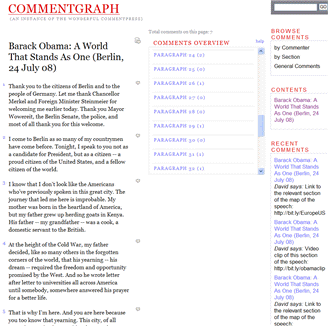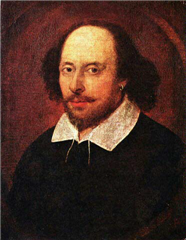Mapping Obama’s Speech in Berlin
As announced on the Global Sensemaking blog, and building on Tim Bonnemann’s excellent Wordle and Mark Szpakowski’s suggestion, I produced a draft map of Barack Obama’s speech in Berlin yesterday, which you can view and explore here.
The snapshot below displays the top layer of the map, and you are welcome to log-in and improve both the top layer and the underlying structure of the first draft.
As noted in the earlier post, the preparation of the first draft of the map emphasised the different senses, dimensions and saliencies of the speech that emerge via the different forms and interpretations: video, transcript, Wordle, and map. And, no doubt, others experiencing Obama’s speech first via TV news analysis, newspaper reports, David Frum, a photograph, or at the speech itself would take away different senses too.
To illustrate how it is possible to develop this kind of mapping analysis further live on the web already, I have started to weave together the map and the transcript of the speech using the Future of the Book’s marvellous CommentPress tool to enable directly addressable, granular access to the text of Barack Obama’s speech, linked to the relevant sections of the map (and vice versa)—with a video clip layered into the latter example for good measure as well.

The granular addressability is shown at the paragraph level in this example; however, CommentPress—which is being applied imaginatively to several public consultations in the UK—allows the user to define a deeper level of granularity, enabling a finer one-to-one correspondence between the source document and the map.
The hope embodied in this experiment is that in the build up to the Presidential election in November it might be possible exemplify the potential of the emerging web technologies to shift the modus of political debate (a degree or two) away from the calculated cacophony of ephemeral soundbites toward a more considered, constructive and cumulative conversation.
If you are willing to help in the pursuit of this goal—working on the transcripts, mapping and tying together the arguments, highlighting inconsistencies and areas of agreement, and holding the candidates transparently accountable to their words—please join us.
To be, or not to be, that is the debate map
A light-hearted debate map of Hamlet’s existential dilemma in Act III Scene I, to commemorate the 444th anniversary of William Shakespeare’s birth on 23 April 1564.

Without further ado, here’s the soliloquy—the medium in which sensitive young men worked out their feelings pre-YouTube:
“To be, or not to be, that is the question;
Whether ’tis nobler in the mind to suffer
The Slings and Arrows of outrageous Fortune
Or to take arms against a sea of troubles,
And by opposing, end them. To die, to sleep;
No more; and by a sleep to say we end
The heart-ache and the thousand natural shocks
That flesh is heir to — ’tis a consummation
Devoutly to be wish’d. To die, to sleep;
To sleep, perchance to dream. Ay, there’s the rub,
For in that sleep of death what dreams may come,
When we have shuffled off this mortal coil,
Must give us pause. There’s the respect
That makes calamity of so long life,
For who would bear the whips and scorns of time,
Th’oppressor’s wrong, the proud man’s contumely,
The pangs of dispriz’d love, the law’s delay,
The insolence of office, and the spurns
That patient merit of th’unworthy takes,
When he himself might his quietus make
With a bare bodkin? who would fardels bear,
To grunt and sweat under a weary life,
But that the dread of something after death,
The undiscovered country from whose bourn
No traveller returns, puzzles the will,
And makes us rather bear those ills we have
Than fly to others that we know not of?”
…and here’s the map of Hamlet’s internal struggle (complete with the embed code for his MySpace blog):
So, how do you rate Hamlet’s arguments—does the proud man’s contumely really sting more than the pangs of dispriz’d love? Either way, I guess Valleywag has the story covered—and, at the risk of a skewed sample, what do you make of Hamlet’s conclusion?
“Thus conscience does make cowards of us all,
And thus the native hue of resolution
Is sicklied o’er with the pale cast of thought,
And enterprises of great pitch and moment
With this regard their currents turn away,
And lose the name of action.”

